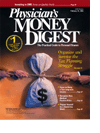Publication
Article
Physician's Money Digest
Find out Who the Happier Americans Are
Author(s):
According to the results of a recent NationalBureau of Economic Research study, andcontrary to what our parents and grandparentshave told us, money can buy happiness.The price tag, however, is high. The study, "Well-BeingOver Time in Britain and the USA" (www.nber.org/papers/w7487), was conducted by economists DavidBlanchflower of Dartmouth College and AndrewOswald of the University of Warwick.
Blanchflower and Oswald based their study on theGeneral Social Surveys of the United States taken from1972 through 1992. These surveys had indicated thatAmericans, though richer when it came to dollars andcents, were poorer in terms of happiness. According tothe surveys, 34% of Americans interviewed in the early1970s described themselves as "very happy." However,by the 1990s that figure had dropped to 30%. The studytook a closer look at those results and reached someinteresting conclusions.
Pricing Happiness
In breaking down the numbers, the two economistsfound that while the happiness of American men hasgrown over the past 3 decades, women's happiness hasactually declined. Looking even closer, Blanchflower andOswald found that while black men and women are lesshappy than their white counterparts, that happiness gapis narrowing.
What the two economists did was assign dollar valuesto the level of unhappiness that would accompanycertain negative life events. For example, the economistsfound that two of the leading factors affecting personalhappiness are being separated from one's spouse andbeing unemployed. They then calculated how muchmoney it would take, in effect, to compensate someonewho suffered one of these emotional traumas.
In other words, all other things being equal,Blanchflower and Oswald wanted to know how much itwould take to compensate an American who was unemployedor had been divorced. The economists determinedthat it would cost approximately $100,000 peryear to offset the unhappiness caused by a divorce and$60,000 a year to ease the pain of unemployment.Looking at this from a glass-is-half-full perspective, itturns out that a happy marriage is worth $100,000 ayear while a job equates to $60,000 annually.
Inside the Numbers
Exactly what is happiness? Psychologists havedefined happiness as the degree to which an individualjudges the overall quality of their life as favorable.Overall, the economists report that happiness is greatestamong women, people who are married, those that arehighly educated, and individuals whose parents did notdivorce. Meanwhile, happiness is lowest among thoseunemployed and individuals in second marriages.
Looking more closely, the percentage of men whoindicated they were very happy in 1976 was 32%; in1998 that figure was 31%. For women, 36% reportedbeing very happy in 1976, while only 29% indicated asmuch in 1998. Apparently, the economists surmise,despite the apparent gains that women have achieved inthe job market, those gains have not translated into afeeling of increased content. So, how much is happiness?
As for price tags, the economists estimate that theannual compensation to offset being male was $13,000;for being black, $31,000; for having never been married,$49,000; for being unemployed, $60,000; for beingdivorced, $66,000; and for being widowed, $75,000.Put a bit more simply, they indicate that a blackAmerican would have to earn $100,000 a year to be ashappy as a white American earning $69,000.
Happiness Patterns
The economists also theorize that degrees of happinesstake on a U-shape pattern over the course of ourlifetimes. The data suggest that people tend to hit thelowest levels of happiness around the age of 40, thengradually swing back upward as they age.
So, for years we've been told that money can't buyhappiness. However, if we accept the hypotheses ofeconomists Blanchflower and Oswald, it would appearthat happiness can be bought after all. But the price tagis awfully expensive.
